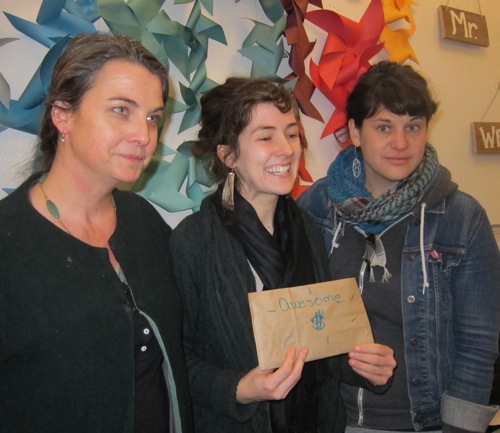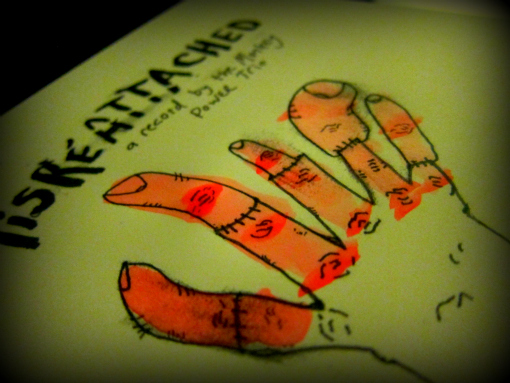We didn’t announce it until this evening, but the October recipient of the Ann Arbor Awesome Foundation’s monthly $1,000 cash grant was Small & Mighty, the scrappy, little entrepreneurial support network created in the fall of 2012 by brilliant local shit-stirrers Jean Henry, Helen Harding and the cheese-loving Lisa Waud. What follows is a transcript of our most recent conversation.

MARK: What is Small & Mighty?
HELEN: We’re still in the defining stages of Small & Mighty, but SAM… my new acronym, since we can’t really use S&M… attempts to provide a more formal support system for businesses in their beginning years. It was already in place to some extent. We found it around town, in bars, at our houses, in the neighborhoods, etc. We were already asking for advice, comparing notes, and just generally talking shop with one another. So far ,our SAM meetings have been somewhat structured in theme, but have also just served as a sounding board for questions, concerns, and issues that we face as very small business owners.
LISA: Just to add to what Helen said, and throw in a little snarkiness… I DESPISE NETWORKING. I love Small & Mighty because we don’t wear nametags, and we always have cheese at our get-togethers. They’re actually fun, and I don’t dread them. Getting together with other self-employed folks — no matter how different our services or products — to slog through the challenges, or share super helpful, positive ideas is… wait for it… awesome.
JEAN: I’m going to follow up on what Lisa said with more of what we are NOT. We are not a start-up incubator. We are not focussed on any one sector… Both of those areas are well covered by other groups in the community… I’m pretty sure even the term ‘small’ is a relative term. We’re a group of newer business owners… I’m the exception– maybe our first entrepreneur-emeritus… who are interested in learning from each other and finding collaborative opportunity. We are also generally in the progressive, creative class category. Many of us are involved in the service sector, but we’ve been reaching out to other types of entrepreneurs. I think they could enrich the social stew and the collaborative potential. We are in the process of defining our mission. There are no official membership criteria. Most small businesses have no choice but to grow incrementally, so it seems we are all comfortable waiting for our identity to emerge naturally. There is no hierarchy, and there are no ‘deliverables.’ No one is paid to run this. If someone thinks they can contribute, and they run an independent business, they are welcome to join.
MARK: Why is a group like Small & Mighty necessary?
HELEN: I’m not sure how necessary SAM is, but I do know it’s incredibly helpful. SAM creates a forum for super-small business owners to ask concrete questions like, “Who has a good accountant?” or “Does someone have a van I could borrow this weekend?” or “I’m looking for some funding sources – who’s successfully gone that route?” to more abstract ideas like work-life balance, running successful meetings, and managing staff.
LISA: Yes. I second all that. We want to pool our complaints and successes, and learn from them. I guess to put it simply, if I can share a ‘Challenge-Overcome’ story that prevents someone else from going through it the hard way, or at least expedites it, then the group is working.
JEAN: Yes! Within SAM, we can comfortably share our ignorance and failures as well as our successes. We talk ‘learning curve’ all the time. I’m not sure that happens at most ‘networking’ events. Someone at a SAM gathering brought up the term ‘co-opetition.’ That’s the other element I would emphasize. We are committed to each other’s success, even when we’re in the same field. I think this may, in the end, be our differential. We are focussed on positive relationships with each other, our co-workers, our customers, our community. Because it works. It makes our businesses better. My 2$ theory: I think small businesses can harness a kind of reverse economy of scale when they work together — relationships based on trust and goodwill are more efficient — and a lot less expensive. That, and being flexible, are the two big assets small businesses have going for them when they go up against the goliath of Big ‘C’ capitalism.
MARK: What were the circumstances that brought the three of you together? And, if, in the process of answering that question, you could each introduce yourself and tell us what you do for a living, that would be great.
HELEN: I’m one of the owners of eat. We’re a catering company, we have a food cart, and a carry-out space on Packard, here in Ann Arbor. Jean hired me when I was in high school at the old Jefferson Market, which was where I met my business partner, Blake Reetz. I think I also met Lisa at the old Jefferson Market, but we work together quite often on the same events. She hosted our food cart when we were first starting out, a couple years ago. We’ve also partnered with her and many other wedding vendors to organize The Wedding Party, which is a not-your-average wedding show… Lisa first approached me about this at last year’s Ann Arbor Film Festival. She said that she and Jean were talking about starting a sort of network-y — support-ish group for small business owners. I think they had that meeting and decided they needed a third organizer to round out their team, so they asked me to join.
LISA: I’m the owner and manager of pot & box. We are a full-service flower shop with daily deliveries and floral design services for weddings and events. We also provide horticultural decor for residences and businesses, with an emphasis on the extraordinary and unusual. We also offer container garden design services to facilitate folks planting up all those pots & boxes out there… Ha! I guess it really does all start back at the Jefferson Market. I lived around the corner, and ate there at least once a day. OK, sometimes three.
JEAN: I used to own Jefferson Market. Now I work for Zingerman’s Community of Businesses to improve our environmental impact. I started my business in order to make the kind of life I wanted for myself and my family. What I learned quite accidentally, as people in the community became very attached to the business, and we became a community center, was that people yearn for community. We were not a perfect family or a perfect business, but we offered something people really craved — and it had nothing really to do with the coffee or the food. I really believe in community. I think we all know we need it, and we all know that, when we build it in the right way, our lives improve. I also believe in ownership… especially for women. Legacy, I’ve learned, happens in unpredictable ways… see eat, Helen and Blake’s business. I guess I hope SAM might be a part of that too. I’m doing this to apply what I’ve learned, and also to spend time with people I really adore. Lisa and I always talked business nuts and bolts. Helen and I do that too. We just, as Helen said, thought we’d broaden and formalize the conversation.
MARK: Until recently, Small & Mighty had been called YEP, which stood for Young Entrepreneurial People… Why did you decide to change the name?
HELEN: We got some flack from people who were part of the YEP network but didn’t consider themselves young. We always thought of “young” as a loose term. I think that’s how it went anyway… Lisa was more in charge of that one.
LISA: We also got flack from people when we changed the name. As someone suggested in an offline comment, “I think you’ll find that the men in the group won’t like ‘Small & Mighty,’” to which I said, after I was done scoffing, “Well, individually, we are small and mighty, and collectively too. It’s perfect. I love it.” Ironically, I was the stubborn one that wanted to call us YEP. Then, after fielding many, many comments questioning the “Y is for Young,” I posted a call for a new name on the group’s Facebook page saying, “What should we call our small and mighty group?” The catalyst to change the name was hearing that we had won the Awesome Foundation grant, and, after a brief Facebook discussion, I renamed the group. SAM.
JEAN: We are not a brand or a marketing group. The name could change again. I am not young. I know ageism exists, so I’m happy we shed the “young.” I also never believe it’s too late to start a new chapter, or to take ownership. I hope we attract people across the age spectrum who are trying something new. I think intergenerational conversation has been lost because we always are dividing and compartmentalizing socially… More cheap philosophy points for me!
MARK: What will your $1,000 grant from the Ann Arbor Awesome Foundation be used for?
HELEN: $1,000! We are so excited and honored to be granted that money.
LISA: Yes! Huzzah! As I said in the application to the Awesome Foundation, we’d love to pay someone for the organizational tasks. (Because, as small business owners, we’re REALLY good at delegating, right ladies?) We’d like to build and cultivate an online presence. We’d like to host inspirational events. I’ve been looking at the monthly meet-up in Detroit called Open City for ideas. They have really terrific panel discussions, and always a great turn out.
JEAN: I see the Awesome Foundation grant as seed money to help us grow. I don’t want SAM ever to become a burden on small business owners who almost always have limited resources. Give us a year and we’ll parlay that $1000 into something, yep, Awesome. That’s what entrepreneurs do. As Lisa said, some will go to essential, but everyday, expenses that will allow the awesome to happen, and some will be held aside for magic-making opportunities. Not sure what form that will take, as the whole group needs to weigh in, but we’ll be happy to report back when we know.
MARK: What do you see as your geographic boundaries? I ask because, with Lisa moving to Detroit, and opening a second Pot & Box store there, I’m wondering if there might be opportunities to join forces with some of the people who are doing exciting work there.
HELEN: So far our geographic boundaries have been the Ann Arbor-Ypsi area, but I feel confident with this new Pot & Box space SAM will have some ties to Detroit.
LISA: Absolutely. I have always maintained that I am a sheepdog, herding like-minded people together. Last week, the staff of Sweet Heather Anne met me at Cliff Bell’s for Open City, and a few of our entrepreneurial friends from Detroit just attended our SAM visioning seminar with Paul Saginaw of Zingerman’s. Soooooo, it’s already happening!
JEAN: I don’t think we are interested in defining geographic boundaries or cultivating that sort of division particularly. I really love Detroit and think it holds the key to Michigan’s future. For many of our group members, the Detroit area would define their market more so than just Ann Arbor-Ypsi. I would never want us to hold ourselves apart from Detroit if any entrepreneur there thought they could have something to gain by partnering with us. It would be super cool if they would sit with us at our welcome table.
MARK: To play Devil’s advocate for a minute…. What would your response be to someone who said to you, “We don’t need Small & Mighty because we already have a Chamber of Commerce“?
HELEN: SAM and the Chamber of Commerce serve different purposes. It’s always felt that the Chamber of Commerce isn’t for super small businesses. SAM provides its network with person-to-person communication lines and support.
LISA: Exactly. And, I would go further to say that someone could ask why we need SAM if we have Think Local First. To which I would answer, that SAM is a hyper-local, user-based, small business support group. I appreciate Think Local First, and have been a member since the beginning. But I can’t be vulnerable about my struggles at the annual TLF meeting like I can sitting around a giant table, eating cheese, and drinking wine with the SAM peeps.
JEAN: Yes to all that Lisa said. I also have been a longtime supporter and past board member (twice!) of TLF. We are… at least on my part… intentionally something quite different. We have no standard ‘deliverables’ like the Chamber or TLF – no marketing function, no public campaigns, and, until now, no real presence. We are a collaborative, scrappy little nuts-and-bolts support group for entrepreneurs.
MARK: What’s the biggest problem facing local entrepreneurs such as yourselves today? Is it access to working capital?
HELEN: Working capital is certainly the biggest obstacle for both start-up and growth. Blake and I keep finding our business at a place where we could potentially expand, but with what money? We get to a spot where we can make it with the infrastructure that we have, but we can’t grow with that infrastructure. Then, in order to grow our business, we have to add more of everything – kitchen equipment, staff, vehicles, etc. How to get that capital to push us up again is always a huge question.
LISA: Working capital, gimme! Of course it’s a challenge. You have to be creative. Or throw it on the credit card and bust some ass to pay it off. But, then again, I am a huge advocate for challenges bringing out the most creative solutions. I think there can be a balance between sourcing funding in creative ways and making it work when you can’t.
JEAN: Access to capital provides the capacity to plan ahead. It’s a tool. The banking system for small and big business are separated, and funds for small, localized businesses are very constricted right now. New pathways are opening. People like Michael Shuman are working to open new channels. The majority of sustained job growth happens in small businesses- – even Romney campaigned on that – but we’re not supporting them sufficiently. Access to capital is also a limiting factor to pursuing environmental sustainability for small businesses. One has to look beyond upfront costs to savings on operating costs to see how it pays for itself – but banks don’t want to go there. Small businesses can’t easily get investors (few qualify legally) and everything from a bank is tied to equity now.
MARK: Who can join Small & Mighty? What kinds of entrepreneurs are you looking for? Are there certain sectors that you’re focused on?
HELEN: The SAM network has been pretty diverse so far. We have folks who, like Jean, are small business/community supporters and great resources. We have folks like Lisa and I who have been in business for a handful of years with an established base. It’s been really interesting to see who comes and what brings them. We aren’t really looking for any certain kind of entrepreneur. It’s great to get in a room with a bunch of people who own very different businesses and find that there some common issues that we all face.
LISA: Our only ‘you must be this high to ride’ stipulation is that we ask that people who attend are “happening,” as Jean says — People who are business-runners, self-employed, or non-profit organizers. This isn’t the place for people who are thinking about maybe this idea that might work for a business… We want reports from the field, and we want to talk about them over a cheese plate.

 Why is it that we allow the Republicans to refer to themselves as the anti-tax party, when they keep demonstrating that they clearly aren’t? Sure, they’re all for the cutting of business taxes, inheritance taxes, and other taxes that would threaten to decrease the wealth of their party’s high-net-worth donors, but, invariably, those shifts in tax policy lead to higher taxes for everyone else. Elsewhere around the United States, the shift may not be as plainly visible, but, here, in Michigan, it’s painfully obvious to all but the most delusional among us. As
Why is it that we allow the Republicans to refer to themselves as the anti-tax party, when they keep demonstrating that they clearly aren’t? Sure, they’re all for the cutting of business taxes, inheritance taxes, and other taxes that would threaten to decrease the wealth of their party’s high-net-worth donors, but, invariably, those shifts in tax policy lead to higher taxes for everyone else. Elsewhere around the United States, the shift may not be as plainly visible, but, here, in Michigan, it’s painfully obvious to all but the most delusional among us. As  I received a cryptic message a few days ago from an anonymous source, telling me that I had to immediately retain an attorney and protect my intellectual property from the evil Korean CEO of Samsung. I wrote it off as the ranting of a delusional reader, as it’s not uncommon for me to receive paranoid emails from folks who, for one reason or another, feel compelled to warn me about impending corporate plots. Today, however, I got a second note concerning Samsung, and, this time, as it came from someone whom I know and trust, I took it a little more seriously. “You and Melissa should get a lawyer,” this person said. “Samsung’s new Gallaxy campaign is a total ripoff of your
I received a cryptic message a few days ago from an anonymous source, telling me that I had to immediately retain an attorney and protect my intellectual property from the evil Korean CEO of Samsung. I wrote it off as the ranting of a delusional reader, as it’s not uncommon for me to receive paranoid emails from folks who, for one reason or another, feel compelled to warn me about impending corporate plots. Today, however, I got a second note concerning Samsung, and, this time, as it came from someone whom I know and trust, I took it a little more seriously. “You and Melissa should get a lawyer,” this person said. “Samsung’s new Gallaxy campaign is a total ripoff of your 










